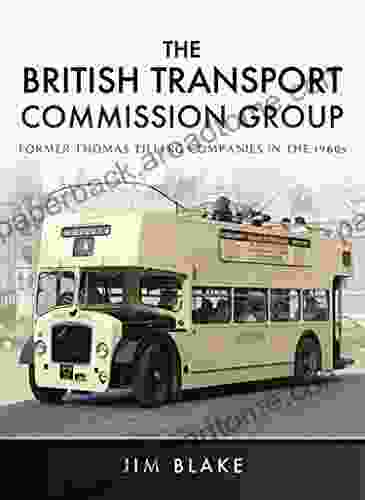The British Transport Commission Group

The British Transport Commission Group was a public corporation that owned and operated the railways, canals, and road transport of the United Kingdom from 1948 to 1962. It was created under the Transport Act 1947, which nationalized the railways, canals, and most of the road transport industry.
4.4 out of 5
| Language | : | English |
| File size | : | 25663 KB |
| Text-to-Speech | : | Enabled |
| Screen Reader | : | Supported |
| Enhanced typesetting | : | Enabled |
| Word Wise | : | Enabled |
| Print length | : | 309 pages |
| Lending | : | Enabled |
History
The origins of the British Transport Commission can be traced back to the early days of the railway industry in the United Kingdom. In the 1840s and 1850s, there was a rapid expansion of the railway network, and by 1850 there were over 6,000 miles of track in operation. However, the railway industry was fragmented, with over 200 different companies operating in the United Kingdom.
In 1870, the government passed the Railway Regulation Act, which established the Board of Trade as the regulatory body for the railway industry. In 1921, the Railways Act created four large railway companies: the Great Western Railway, the London and North Eastern Railway, the London, Midland and Scottish Railway, and the Southern Railway.
After World War II, the Labour government decided to nationalize the railway industry. The Transport Act 1947 created the British Transport Commission, which took over the ownership and operation of the railways, canals, and most of the road transport industry.
Structure
The British Transport Commission was a public corporation, which meant that it was owned by the government. The Commission was governed by a board of directors, who were appointed by the Minister of Transport. The Commission was divided into six main departments: the Railway Executive, the Road Transport Executive, the Waterways Executive, the Docks and Inland Waterways Executive, the Hotels Executive, and the Research Executive.
The Railway Executive was responsible for the operation of the railways. The Road Transport Executive was responsible for the operation of the bus and coach services. The Waterways Executive was responsible for the operation of the canals. The Docks and Inland Waterways Executive was responsible for the operation of the ports and inland waterways. The Hotels Executive was responsible for the operation of the hotels owned by the Commission. The Research Executive was responsible for the research and development activities of the Commission.
Operations
The British Transport Commission was responsible for the operation of a wide range of transport services. The railways were the most important part of the Commission's operations, and in 1948 the Commission operated over 20,000 miles of track. The Commission also operated a large number of bus and coach services, and in 1948 it owned over 8,000 buses and coaches. The Commission also operated a number of canals, and in 1948 it owned over 2,000 miles of canals.
The British Transport Commission played a major role in the development of the transport industry in the United Kingdom. The Commission's investment in new infrastructure and equipment led to a significant improvement in the quality of transport services. The Commission also played a key role in the development of new technologies, such as the diesel locomotive and the container ship.
Legacy
The British Transport Commission was dissolved in 1962, and its assets were transferred to a number of different organizations. The railways were transferred to British Railways, the bus and coach services were transferred to the National Bus Company, and the canals were transferred to the British Waterways Board. The Docks and Inland Waterways Executive was transferred to the British Transport Docks Board, and the Hotels Executive was transferred to the British Transport Hotels Board.
The British Transport Commission's legacy is still visible today. The railways, canals, and road transport networks that were developed by the Commission are still in use today, and they play a vital role in the UK economy. The Commission's investment in new technologies also led to the development of new industries, such as the container shipping industry.
The British Transport Commission was a major force in the development of the transport industry in the United Kingdom. The Commission's investment in new infrastructure and equipment led to a significant improvement in the quality of transport services. The Commission also played a key role in the development of new technologies, such as the diesel locomotive and the container ship. The Commission's legacy is still visible today, and its railways, canals, and road transport networks continue to play a vital role in the UK economy.
4.4 out of 5
| Language | : | English |
| File size | : | 25663 KB |
| Text-to-Speech | : | Enabled |
| Screen Reader | : | Supported |
| Enhanced typesetting | : | Enabled |
| Word Wise | : | Enabled |
| Print length | : | 309 pages |
| Lending | : | Enabled |
Do you want to contribute by writing guest posts on this blog?
Please contact us and send us a resume of previous articles that you have written.
Light bulbAdvertise smarter! Our strategic ad space ensures maximum exposure. Reserve your spot today!
 Jorge AmadoFollow ·3.2k
Jorge AmadoFollow ·3.2k Braden WardFollow ·8.9k
Braden WardFollow ·8.9k Jonathan FranzenFollow ·10.5k
Jonathan FranzenFollow ·10.5k Jace MitchellFollow ·6.9k
Jace MitchellFollow ·6.9k Duane KellyFollow ·4.1k
Duane KellyFollow ·4.1k Jorge Luis BorgesFollow ·12.8k
Jorge Luis BorgesFollow ·12.8k Jake CarterFollow ·11.8k
Jake CarterFollow ·11.8k Emmett MitchellFollow ·8.5k
Emmett MitchellFollow ·8.5k

 Isaiah Powell
Isaiah PowellWisconsin Clinic Pilots Mobile Crisis Response System For...
MADISON, Wis. - A new mobile crisis...

 Daniel Knight
Daniel KnightUnleash Your Creativity: A Masterclass in Fabulous Nail...
Embellish Your Fingertips with Captivating...

 Clark Campbell
Clark CampbellDetect When You Are Being Emotionally Manipulated By...
Emotional manipulation is a subtle but...

 Eli Brooks
Eli BrooksNeurological Disorders Papers: Dissociative Identity...
What is Dissociative...

 Ricky Bell
Ricky BellAn Introduction to Islam for Jews: Unveiling the Tapestry...
A Bridge of Understanding: Exploring Islam for...

 Octavio Paz
Octavio PazAchieving Longevity: The Complete Step-by-Step Guide to...
**** In the ever-evolving landscape of health...
4.4 out of 5
| Language | : | English |
| File size | : | 25663 KB |
| Text-to-Speech | : | Enabled |
| Screen Reader | : | Supported |
| Enhanced typesetting | : | Enabled |
| Word Wise | : | Enabled |
| Print length | : | 309 pages |
| Lending | : | Enabled |


















































